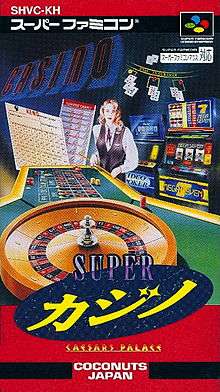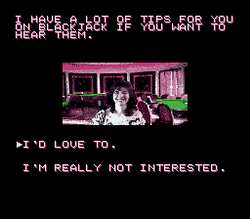Super Caesars Palace
Super Caesars Palace is a Super Nintendo Entertainment System casino video game centered on Caesars Palace in Las Vegas, Nevada. It is the follow-up to Virgin's previous Caesars Palace game. Super Caesars Palace was also released for the Sega Genesis and Game Gear as Caesars Palace. The Japanese version of the game was followed by a sequel, Super Casino 2.
| Super Caesars Palace | |
|---|---|
 Japanese cover art | |
| Developer(s) | The Illusions Gaming Company |
| Publisher(s) | |
| Composer(s) | Matt Furniss (Game Gear version), Tommy Tallarico[1] Steve Henefin[1] |
| Series | |
| Platform(s) | Super Nintendo Entertainment System Sega Genesis Sega Game Gear |
| Release | |
| Genre(s) | Casino |
| Mode(s) | Single-player |
Gameplay

The object is to win much money starting with $2000 that the player takes to the casino. After playing, the player leaves in either a limo, a Greyhound bus or in a taxi. The game even informs the player of his or her slow play. A warning pops up on the screen and if it is unheeded, then the player is forced to do a certain action against his or her will. When the player finally leaves the casino using the transportation offered to him or her, the credits appear as road signs along the desert highway and the player has to restart his or her game. Games include blackjack, slot machines, roulette, horse racing, Keno, video poker, and Red Dog.
The player can talk to non-player characters (a feature omitted in the Japanese version) and they may offer advice and clues on how to live the casino lifestyle. The game also offers $100 scratch-off tickets that players can keep scratching to try to win more money. However, if a picture of a bomb is uncovered, the ticket is void and all winnings are nullified.[3]
Reception
Allgame gave the game a rating of 2.5 out of 5 stars in their overview.[4] Video Games & Computer Entertainment gave the game a 60% rating in their March 1994 review. Game Informer Magazine rated it an 8 out of 10 in their April 2000 review.[5]
References
- "Composer information". SNESMusic.org. Retrieved 2012-01-13.
- "Summary". GameFAQs. Retrieved 2008-09-10.
- "Description/Information". Nintendo City. Retrieved 2008-09-10.
- "Rating information". allgame. Retrieved 2012-09-29.
- "Rating information". MobyGames. Retrieved 2012-09-29.